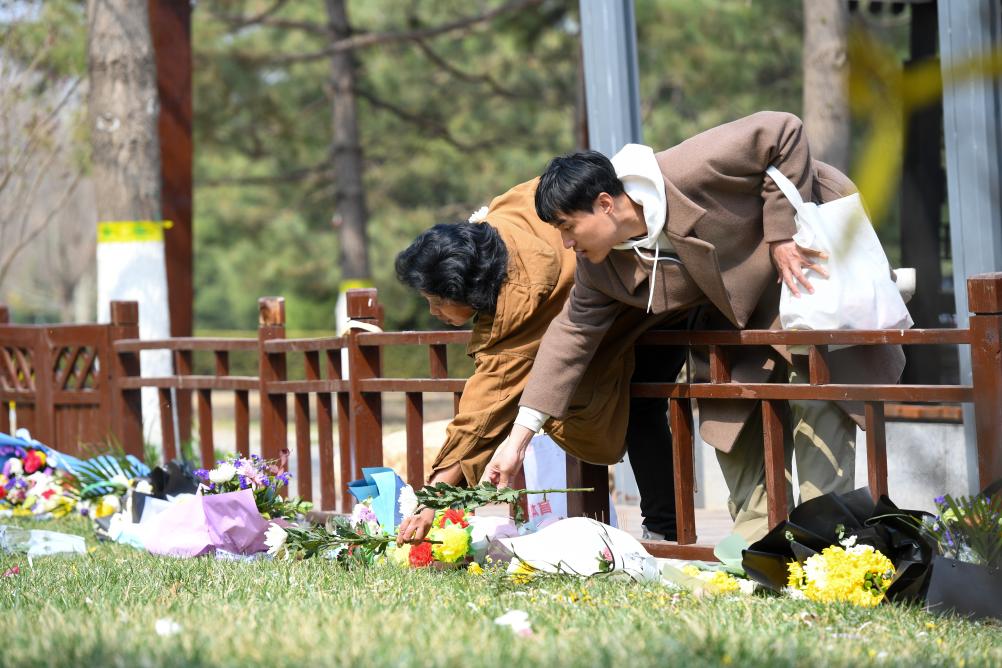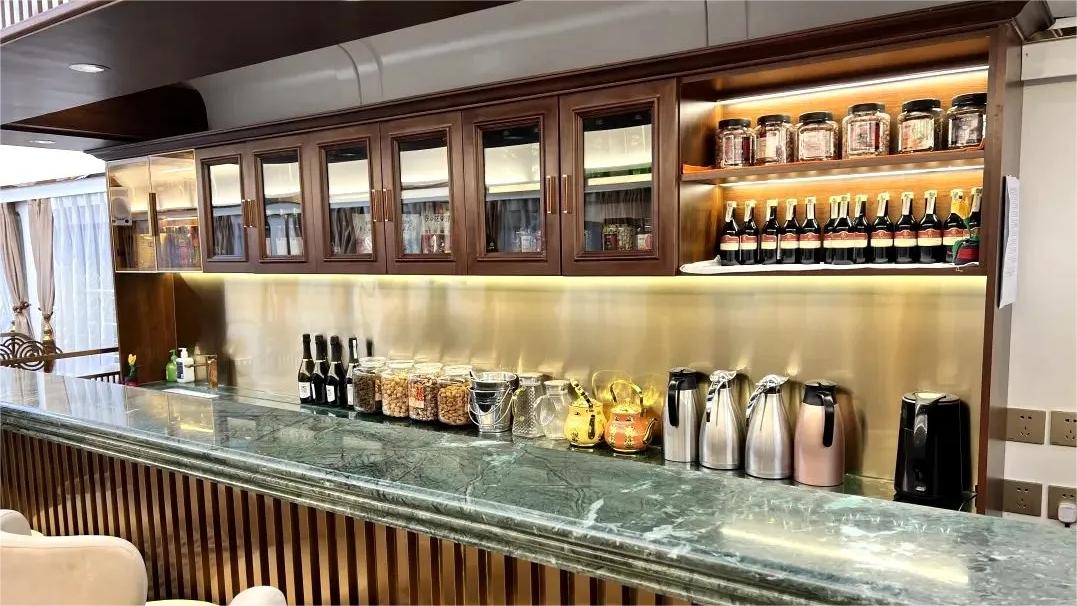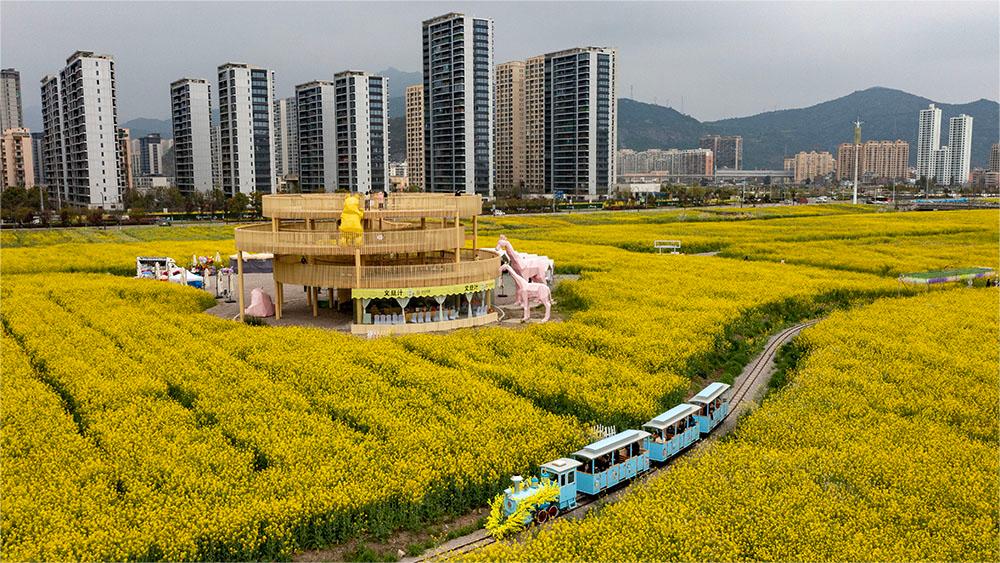Chinese people embrace eco-friendly, open attitude toward death

People lay flowers to mourn the deceased at a cemetery in Beijing, capital of China, April 2, 2024. (Xinhua/Ju Huanzong)
LANZHOU, April 5 (Xinhua) -- In the Tianqiao public cemetery in Lanzhou, the capital city of northwest China's Gansu Province, sun filters through the cypresses that line the roads, casting light on the chrysanthemums surrounding the graves.
The entire cemetery is enveloped in solemn tranquility, only interrupted by the occasional murmurs of visiting crowds.
In China, Qingming Festival, which falls on Thursday this year, has longstanding tomb-sweeping and ancestor worship traditions. From the spring equinox to Qingming every year, tomb-sweeping activities peak in the cemetery, which receives up to 6,000 visitors each day.
Despite this year's influx, the cemetery remains tranquil and tidy, far from how it was in the past, when the air was often full of heavy smoke and dust from the burning of paper offerings.
Many Chinese people believe that burning paper money can ensure a prosperous afterlife for their deceased loved ones.
"We now advocate the use of fresh flowers instead of traditional paper offerings for tomb-sweeping, as it is more environmentally friendly and safer," said Wang Wei, who works at the Tianqiao cemetery.
Wang said that traditional rites also used to trigger fires as graveyards are usually located near forest areas.
In recent years, the Chinese government has promoted environmental protection by encouraging changes to certain burial and ritual customs, optimizing both online and offline funeral services, and fostering more modern commemoration activities.
Flowers in lieu of paper money, ribbons to express condolences, letter-writing and online tomb-sweeping are among the ways to pay tribute to the dead that are gaining increasing popularity across the country.
Wang, who has worked at the Tianqiao cemetery for 16 years, attributes the widespread acceptance of low-carbon and simplified rituals to the public's changing perceptions of life and death.
"More and more people are beginning to understand that the essence of ancestor worship and commemorating their loved ones is their heartfelt remembrance, rather than the numbers or forms of offerings," Wang said.
According to Liu Wansheng, head of a Lanzhou funeral parlor, increasing numbers of people living far away from their hometowns are turning to worship and tomb-sweeping by proxy, as well as online memorial services.
By the end of March, the funeral parlor had carried out more than 1,200 online memorial services and opened over 300 online memorial halls.
This year, 36-year-old Wang Fangfang, a staff member of the Lanzhou funeral parlor, started offering professional funeral consultation services.
"Some people feel overwhelmed when facing the death of a loved one, and they can call us for help," she said, noting that she has observed that more and more people are viewing funerals rationally, only hoping that they are decent and full of respect.
Rather than erecting tombstones, some are opting for eco-friendly alternatives like wall, tree or lawn burials.
"These new types of graves only occupy about 0.8 square meters, roughly half the space of traditional graves," said Yang Xiaoping, head of the Tianqiao cemetery.
According to the country's Ministry of Civil Affairs, the public acceptance of eco-burial methods has been on the rise in recent years. Over the last three years, the proportion of people opting for eco-friendly burials has increased to 3.2 percent in China.
"For a long time, talking about death has been a taboo for Chinese people, and some in the funeral services sector have even had to avoid mentioning their profession to others, or shaking hands with other people. And some have even had to avoid attending weddings and other celebrations," said Liang Wei, head of the comprehensive management department of the Lanzhou funeral parlor.
"However, things have changed. The public, especially young people, are becoming more open-minded and regard us simply as people working in the services sector," Liang said.
Accordingly, increasing numbers of young people are willing to join the funeral industry, according to Liu. Recruitment at the funeral parlor is not as challenging as it was before, and staff members below the age of 40 account for about half of its current total.
"Death is a part of life, and funerals are the final farewell ceremonies for the deceased. Understanding death can also lead to better respect for life," Liu added.
Photos
 Migratory birds spotted in Karamay, NW China's Xinjiang
Migratory birds spotted in Karamay, NW China's Xinjiang Tourist-dedicated New Orient Express gears up to offer luxury train travel around NW China's Xinjiang
Tourist-dedicated New Orient Express gears up to offer luxury train travel around NW China's Xinjiang Spectacular sea of blooming rapeseed flowers attracts tourists to Yueqing, E China's Zhejiang
Spectacular sea of blooming rapeseed flowers attracts tourists to Yueqing, E China's Zhejiang Rare bird species spotted in north China's grassland
Rare bird species spotted in north China's grassland
Related Stories
- Letter from China: Earth Hour: Lights off, green action on
- Eco-friendly shift brings prosperity to farmers
- Ankang City in NW China sees rapid growth of eco-friendly industries
- Beijing seeking eco-friendly take-away food packaging
- Discover Beijing’s eco-friendly communities
- Xinhua Insight: China promotes eco-friendly burials
- Eco-friendly life of a Beijing youth
- Xinhua Insight: Chinese cities promote eco-friendly urbanization (2)
- China issues list of eco-friendly rare earth firms
- Eco-friendly Christmas decorations
Copyright © 2024 People's Daily Online. All Rights Reserved.





